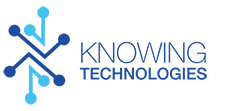For the last 3 years, April Garcez has been teaching theology and social studies to sophomores at Mayfield Senior High, an independent, all-girls Catholic school in Pasadena, CA offering grades 9-12. The school enrolls about 330 girls and emphasizes good teaching with a progressive approach to learning blended into its rich tradition within the city of Pasadena. Their technology program is centered around a BYOD model, in which students can bring an Apple laptop or iPad device of their choice into their classes.
Last year, April was a member of Mayfield’s instructional cohort (see here for more on the KT instructional technology coaching program), the first such cohort at the school. Before working with Knowing Technologies, though April considered herself proficient with technology she recognized that she could improve her fluency in using it. In particular, she was interested in identifying new web-based resources for her students to help them become more skillful researchers. For that reason, she was excited by the opportunity to join the Knowing Technologies instructional coaching program, thanks in part to the 1-on-1 attention she would receive, along with the accountability she would also have for her own professional growth.
Upon beginning her work with Elaine Wrenn, her instructional coach, she quickly made progress toward her goals of better engaging her students with technology, while investigating how she might take advantage of Mayfield’s BYOD program to use interactive notebooks in such a way that would help her students become deeper thinkers. In her own words, April’s focus with Elaine shifted from “technical to intellectual” pursuits in the course of the program. And with Elaine’s guidance, she was able to dispel her fears that she lacked the time to implement new technology or that experimenting with her current lesson plans would be too time consuming and disruptive.
In her coaching sessions, April developed a project that invited her students to create an NGO business focusing on a problem they were challenged to identify. The project was designed by April to grow their research, presentation, and general life skills, and more specifically, April’s students learned how to practice the design thinking process by basing the research around the empathy they gained for those affected by the problems. Rather than see the problems with an “us vs. them” mentality, April taught her students how to develop solutions with an “all of us together” mindset that considers how they might be able to help people live better lives.
For the technological component of their project work, April’s students made use of Noodle Tools for draft writing and building citations. They also improved their research skills by creating databases and budgets for their NGO business using Google Sheets, and each student created a blog that included written and video reflections on their process and comments from their peers. Upon completing their projects, her students practiced their presentation skills by presenting their project work to the wider Mayfield community using Prezi, Google Slides, and Keynote .
Moving forward into the 2018-19 academic year, April plans on continuing to integrate digital interactive notebooks in her classes, while using them to create portfolios for student work. And her work with Elaine has inspired her to implement challenge-based learning in classes. April also plans on growing the NGO project in the coming years by implementing an institution for alumni to continue working on problems they uncovered, with the goal of offering summer opportunities for project work.
April’s experience in the cohort has helped her to assume more leadership at Mayfield. In full-faculty meetings, for example, April and her cohort offered breakout sessions for the entire faculty, when she demonstrated how her students effectively engage in idea sharing and digital debates. For students who are less inclined to talk in class, she demonstrated how she creates opportunities to offer written opinions using tricider, a free online tool for brainstorming, collaboration, and social voting. And as department chair, April intends on sharing her learning and growth mindset with her colleagues, while creating opportunities in department meetings for others to share ideas. One of her department members, in fact, will be a part of the 2018-19 cohort at Mayfield and will certainly benefit from April’s mentorship.
Through her work with Elaine, April has come to appreciate the value of sharing her work and has since begun doing so with the wider educational community. As a result, April was accepted as a presenter at two conferences this summer, including the C3 Tech Conference in Los Angeles where she led a workshop for other educators on igniting student understanding through simple digital video creation, and she plans on submitting other conference proposals in the near future.
For those considering applying for their own school’s instructional coaching cohort, April strongly encourages you to do so. “The program offers an 1-on-1 opportunity to work with an experienced mentor that you won’t get anywhere else,” she says. “Once you learn skills with your mentor, there’s no turning back. You use them and run with them, which is the best thing about investing time with your mentor. It is the best investment of time you can do for yourself.”
Find April on Twitter at @MrsGarcez_MSS and stay updated with her and other cohort members here on our blog or at @KnowingTechK12. If interested in learning more about what Knowing Technology does with schools, please feel free to reach out to us—we’d love to meet you!




